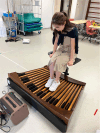Organ pedalboard as a rehabilitation tool: A qualitative exploratory study of healthcare providers' perceptions and recommendations
- PMID: 39700086
- PMCID: PMC11658632
- DOI: 10.1371/journal.pone.0314147
Organ pedalboard as a rehabilitation tool: A qualitative exploratory study of healthcare providers' perceptions and recommendations
Abstract
Objective: This qualitative study explored healthcare providers' perceptions and attitudes regarding the use of organ pedalboards as a rehabilitation tool, particularly for lower extremity conditions. The study also sought to identify the perceived barriers and facilitators to adopting organ pedalboards within rehabilitation settings, as well as gather healthcare providers' recommendations for integrating this tool into clinical practice.
Method: Healthcare providers, including physiotherapists, occupational therapists, music therapists, and sports therapists, were recruited for focus group interviews using purposive and snowball sampling. At the outset of the interview, participants watched an organist playing musical notes on a pedalboard and had the opportunity to try on the pedalboard. A researcher then modulated the group discussion with the organist and asked questions following a semi-structured interview guide. The guided questions concern the perceptions of using organ pedal training for patients, as well as participants' attitudes and perceived barriers towards it. Verbatim transcription and content analysis were performed on qualitative data.
Findings: Seventeen healthcare providers were interviewed in four focus groups. Healthcare providers perceive music as a motivator in rehabilitation, aiding in natural movement through rhythm and beats. Music intervention, particularly training on the pedalboard, is seen as beneficial for lower extremity rehabilitation, improving range of motion, balance, and coordination. It also offers cognitive benefits and enhances patient engagement and psychosocial well-being. Its safety concerns were addressed and discussed.
Conclusion: Our study is the first to explore the feasibility of using a pedalboard as a rehabilitation tool. Healthcare providers identify the circumstances and potential therapeutic benefits of the use of organ pedal training in the management of lower extremity problems. This will assist in the development of a lower extremity training protocol that can accommodate all the physiological hip, knee, ankle, and foot movements in the future.
Copyright: © 2024 Kan et al. This is an open access article distributed under the terms of the Creative Commons Attribution License, which permits unrestricted use, distribution, and reproduction in any medium, provided the original author and source are credited.
Conflict of interest statement
The authors have declared that no competing interests exist.
Figures
References
-
- MacDonald R, Kreutz G, Mitchell L. What is Music, Health, and Wellbeing and Why is it Important? In: MacDonald R, Kreutz G, Mitchell L, editors. Music, Health, and Wellbeing. Oxford: Oxford University Press; 2012.
-
- Byers J, Smyth K. Effect of a music intervention on noise annoyance, heart rate, and blood pressure in cardiac surgery patients. American Journal of Critical Care. 1997;6(3):183–91. - PubMed
-
- Kuhn D. The Effects of Active and Passive Participation in Musical Activity on the Immune System as Measured by Salivary Immunoglobulin A (SlgA). Journal of Music Therapy. 2002;39(1):30–9. - PubMed
MeSH terms
LinkOut - more resources
Full Text Sources


